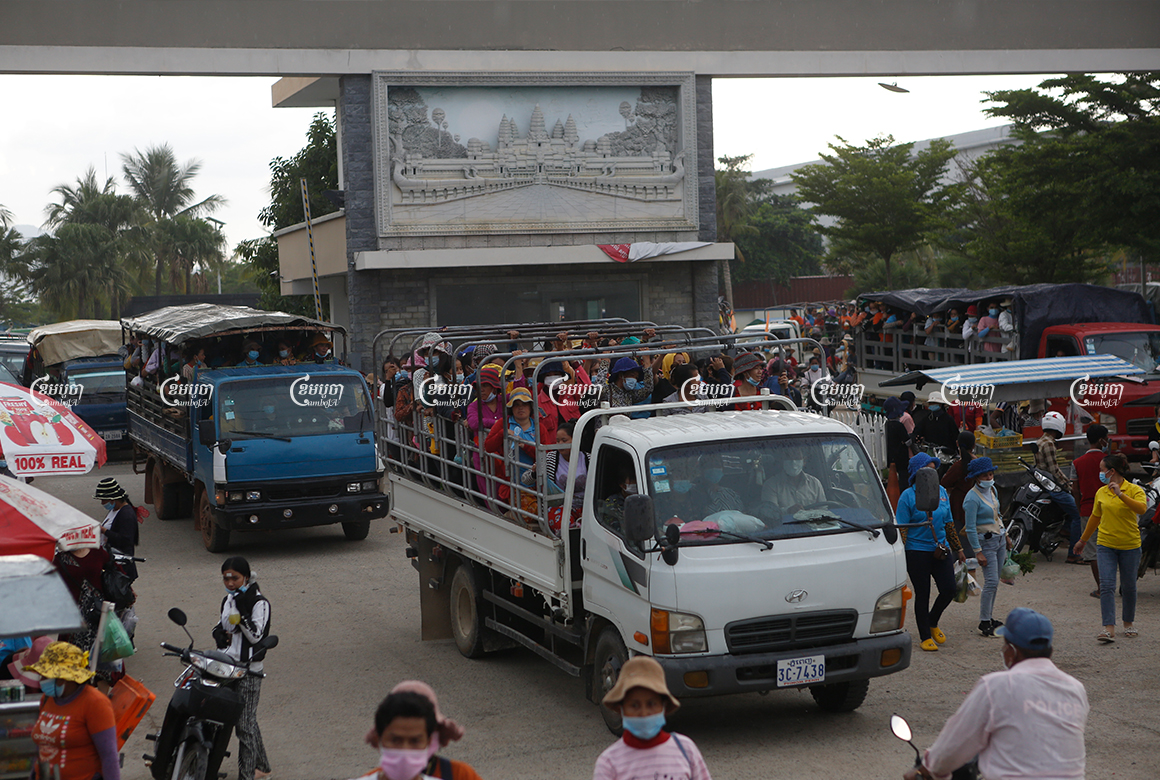District authorities in Kampong Cham province are rushing to investigate a local outbreak of COVID-19 after finding dozens of new infections at two local footwear factories.
A provincial statement issued Thursday said 51 workers had tested positive for COVID-19 between factories owned by the Carlington and Juhui Footwear companies. Both facilities are located in the province’s Choeung Prey district and, as in other recent outbreaks among garment workers, authorities are now pointing to tightly packed truck transports as a possible source of infection.
The latest cases add to 35 confirmed yesterday among garment workers in Kampong Cham province and appear to be connected to the flow of factory staff out of Phnom Penh after travel from the capital was permitted to resume May 6. Health officials in other central provinces, including Kampong Chhnang and Kampong Speu, reported this week dozens of cases fitting that same pattern. On Thursday, Takeo authorities also announced 41 new COVID-19 infections, mostly among garment workers.
In Kampong Cham, deputy provincial Governor Heng Vanny confirmed authorities had temporarily closed the Carlington footwear factory as one of four manufacturers with recorded cases of COVID-19. The other three factories, including Juhui, have just closed parts of their operations.
The Carlington factory employs about 7,000 people, Vanny said.
Provincial health department director Kim Souphirun did not comment, but Choeung Prey district Governor Aut Chheangly said officials are now tracing contacts and testing individuals linked to the workers. This investigation is happening in his district and in those of Batheay and Prey Chhor, where many of the workers live.
“We have taken samples who have direct contact with workers who tested positive, including their family members,” Chheangly said, explaining that physicians on Thursday began testing about 200 people. “We are really worried because they are living with their parents and family members.”
Chheangly said he had also ordered local commune and village officials to collect the people with direct contact with those confirmed to have COVID-19 for a mandatory 14-day quarantine at health centers. Individuals who had indirect contact may quarantine at their homes.
Phet Sophal, Batheay district governor, confirmed to CamboJA that local authorities are doing the same work of testing and isolating contacts.
“When garment workers have tested positive, our local authorities have tied up or set up barriers surrounding their houses, not allowing them to go out until the final testing is negative,” he said.
Provincial officials elsewhere in Cambodia are taking similar measures to stop local outbreaks of COVID-19.
Nuth Sinat, health director of Takeo province, announced Thursday the 41 people there who had tested positive for the virus had mainly included garment workers employed in neighboring Kandal province and visiting their homes. Other cases found in Takeo were among migrant workers returning from Thailand.
Sinat said the people had tested positive for COVID-19 after finishing quarantine, which began for most of them on May 3-4 when they returned to their home province. After testing positive, the workers were immediately placed back in quarantine, Sinat said.
In Kampong Chhnang province, where at least 20 new cases of COVID-19 were announced Wednesday, health department director Prak Vun said no new infections have been recorded since. Physicians collected more than 100 samples for testing, including from employers, but haven’t yet received results.
Labor leaders say the main preventive measures used to curb factory outbreaks, which so far have included partial closures of job-sites with recorded COVID-19 infections, don’t go far enough to protect workers.
Ath Thorn, president of Cambodian Labor Confederation, said authorities on provincial levels should lock down some areas or villages where workers have tested positive for the virus.
“If the situation continues, we will submit a letter to the Ministry of Labor for stronger preventive measures like in Phnom Penh,” said Thorn, in reference to the capital’s lockdown procedures that temporarily shut the core of the national garment production sector.








